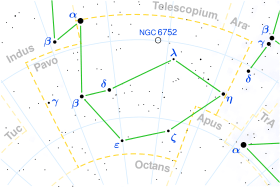Epsilon Pavonis
| Observation data Epoch J2000 Equinox J2000 | |
|---|---|
| Constellation | Pavo |
| Right ascension | 20h 00m 35.55558s[1] |
| Declination | −72° 54′ 37.8198″[1] |
| Apparent magnitude (V) | 3.97[2] |
| Characteristics | |
| Spectral type | A0Va[2] |
| U−B color index | -0.05[3] |
| B−V color index | -0.03[2] |
| Astrometry | |
| Radial velocity (Rv) | -6.70[4] km/s |
| Proper motion (μ) | RA: +81.78[1] mas/yr Dec.: -132.16[1] mas/yr |
| Parallax (π) | 31.04 ± 0.17[1] mas |
| Distance | 105.1 ± 0.6 ly (32.2 ± 0.2 pc) |
| Absolute magnitude (MV) | 1.43[2] |
| Details | |
| Mass | 2.2[5] M☉ |
| Radius | 1.74[6] R☉ |
| Luminosity | 32[7] L☉ |
| Surface gravity (log g) | 4.32±0.02[6] cgs |
| Temperature | 10,440[8] K |
| Rotational velocity (v sin i) | 85[7] km/s |
| Age | 27[6] Myr |
| Other designations | |
| Database references | |
| SIMBAD | data |
Epsilon Pavonis (ε Pav) is a class A0V[2] (white main-sequence) star in the constellation Pavo. Its apparent magnitude is 3.97[2] and it is approximately 105.1 light years away based on parallax.[1]
References
- 1 2 3 4 5 6 Van Leeuwen, F. (2007). "Validation of the new Hipparcos reduction". Astronomy and Astrophysics. 474 (2): 653. Bibcode:2007A&A...474..653V. arXiv:0708.1752
 . doi:10.1051/0004-6361:20078357. Vizier catalog entry
. doi:10.1051/0004-6361:20078357. Vizier catalog entry - 1 2 3 4 5 6 Anderson, E.; Francis, Ch. (2012). "XHIP: An extended hipparcos compilation". Astronomy Letters. 38 (5): 331. Bibcode:2012AstL...38..331A. arXiv:1108.4971
 . doi:10.1134/S1063773712050015. Vizier catalog entry
. doi:10.1134/S1063773712050015. Vizier catalog entry - ↑ Mermilliod, J. C. (2006). "VizieR Online Data Catalog: Homogeneous Means in the UBV System (Mermilliod 1991)". VizieR On-line Data Catalog: II/168. Originally published in: Institut d'Astronomie. 2168. Bibcode:2006yCat.2168....0M.Vizier catalog entry
- ↑ Gontcharov, G. A. (2006). "Pulkovo Compilation of Radial Velocities for 35 495 Hipparcos stars in a common system". Astronomy Letters. 32 (11): 759. Bibcode:2006AstL...32..759G. doi:10.1134/S1063773706110065.
- ↑ Tetzlaff, N.; Neuhäuser, R.; Hohle, M. M. (2011). "A catalogue of young runaway Hipparcos stars within 3 kpc from the Sun". Monthly Notices of the Royal Astronomical Society. 410: 190. Bibcode:2011MNRAS.410..190T. arXiv:1007.4883
 . doi:10.1111/j.1365-2966.2010.17434.x. Vizier catalog entry
. doi:10.1111/j.1365-2966.2010.17434.x. Vizier catalog entry - 1 2 3 Gerbaldi, M.; et al. (June 1999), "Search for reference A0 dwarf stars: Masses and luminosities revisited with HIPPARCOS parallaxes", Astronomy and Astrophysics Supplement, 137 (2): 273–292, Bibcode:1999A&AS..137..273G, doi:10.1051/aas:1999248.
- 1 2 Zorec, J.; Royer, F. (2012). "Rotational velocities of A-type stars". Astronomy & Astrophysics. 537: A120. Bibcode:2012A&A...537A.120Z. arXiv:1201.2052
 . doi:10.1051/0004-6361/201117691. Vizier catalog entry
. doi:10.1051/0004-6361/201117691. Vizier catalog entry - ↑ David, Trevor J.; Hillenbrand, Lynne A. (2015). "The Ages of Early-Type Stars: Strömgren Photometric Methods Calibrated, Validated, Tested, and Applied to Hosts and Prospective Hosts of Directly Imaged Exoplanets". The Astrophysical Journal. 804 (2): 146. Bibcode:2015ApJ...804..146D. arXiv:1501.03154
 . doi:10.1088/0004-637X/804/2/146. Vizier catalog entry
. doi:10.1088/0004-637X/804/2/146. Vizier catalog entry
This article is issued from
Wikipedia.
The text is licensed under Creative Commons - Attribution - Sharealike.
Additional terms may apply for the media files.
